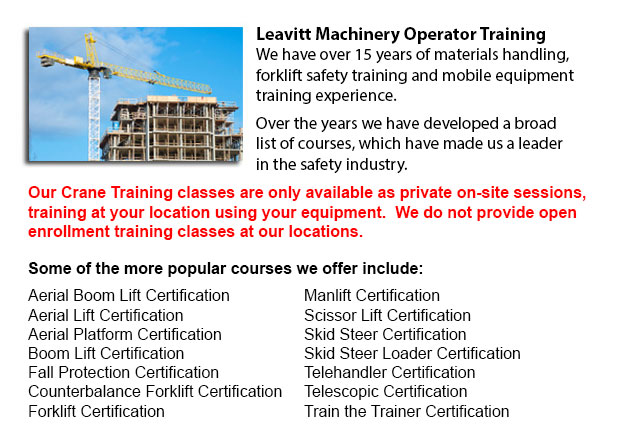
Port Coquitlam Crane Training Courses - The heavy machinery crane is meant to lower, move and lift heavy materials. Usually, the crane comes outfitted along with a hoist, sheaves, and chains or wire ropes. Cranes are utilized in the businesses of manufacturing, construction and transport. These machines truly help with the loading and unloading of freight, moving materials, and the assembling of heavy equipment.
There are numerous various kinds of cranes in operation, designed particularly for certain uses. The Jib crane, the smallest crane, is intended to be used indoors. Tower cranes are the tallest type, intended for building construction. In order to access tight spaces, mini-cranes are Utilized. Floating cranes are utilized salvaging operations and oil rig construction on water.
Crane operating procedure would be reviewed everyday in the crane training course session. The implementation of proper overhead material handling procedures is included in the course. Right training means less maintenance costs and longer machinery lifespan. The course instructs participants in inspection and operating methods focused on all application, like right rigging and slinging. Individuals participating can handle critical crane parts to familiarize themselves with mechanical parts. Lifting practices would be shown together with suggested methods for review by your safety committee. Sessions would feature demonstration videos. The crane training course comprises a reference and resource guidebook.
Course content comprises machinery terms; codes about overhead cranes, attachments and hoists; proper inspection ways; right sling use; essential maintenance procedures and requirements.
Equipment Covered: All Kinds of Slings; All Types of Below-the-Hook Devices; Wire Rope and Electric Chain Hoists; Lever Hoists Hand Chain Hoists; Patented and light railed cranes; Jib Cranes; Standard overhead Cranes; Cab Operated Cranes; Magnet Applications; Radio Controlled Applications and Hot Metal Functions.
You can ask regarding our customized training courses, such as rigging training as a refresher; electric chain hoists for theaters, bilingual training in hazardous settings; high lifts; pedestal, jib and gantry cranes.
-
Port Coquitlam Order Picker Training
Port Coquitlam Order Picker Training - Order picker's allows warehouse workers to lift pallets utilizing forks. Also known as a stock picker, this electrically-powered machinery is like a forklift except that an order picker is also made use of to li... More -
Port Coquitlam Telehandler Operator Training
Port Coquitlam Telehandler Operator Training - Telehandler forklifts or Telescopic Handler forklifts are common industrial machinery found in numerous construction industry environment. The telehandler is a useful machine and makes for a valuable too... More -
Port Coquitlam Crane Operator Classes
Port Coquitlam Crane Operator Classes - For the operators and the supervisors, new and current, the crane operator training course is suitable for all. Course content includes applicable federal, provincial and state safety regulations. The first com... More -
Port Coquitlam Loader Operator Training
Port Coquitlam Loader Operator Training - What It Actually Takes To Finish A Loader Operator Training Course - Lift truck training is a prerequisite within North America and is intended to prevent workplace injuries and death. Forklift training offer... More -
Port Coquitlam Scissor Lift Certification
Port Coquitlam Scissor Lift Certification - Numerous worksites and tradespeople like for instance welders, masons and iron workers utilize scissor lift platforms in order to help them reach elevated work places. The operation of a scissor lift is usu... More -
Port Coquitlam Aerial Platform Training
Port Coquitlam Aerial Platform Training - Aerial lifts are able to accommodate numerous duties involving high and tough reaching spaces. Normally utilized to perform routine upkeep in buildings with lofty ceilings, trim tree branches, hoist burdensom... More -
Port Coquitlam Manlift Safety Training
Port Coquitlam Manlift Safety Training - It is vital for skilled Manlift operators to be aware of the connected dangers that come with particular types of scissor lifts. They should be able to operate the scissor lift in a way that protects not only... More -
Port Coquitlam Heavy Equipment Training Courses
Port Coquitlam Heavy Equipment Training Courses - When choosing a heavy equipment operator course, the first step should be to determine the capacity in which you would be working with heavy machinery. You could find the best course to teach you how... More

Forklift Certification Port Coquitlam
TOLL FREE: 1-888-254-6157
Port Coquitlam, British Columbia
forkliftcertificationportcoquitlam.com
Email Us
About Us


